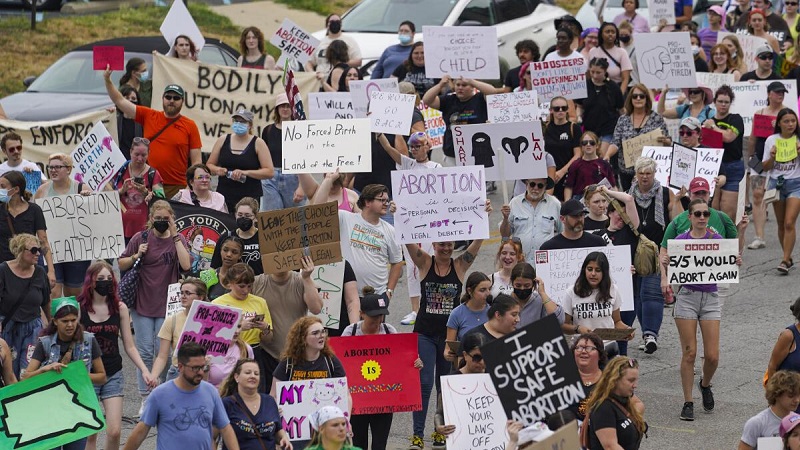Local News
Indiana limits abortion data for privacy under near-total ban; some GOP candidates push back

Indianapolis, Indiana – Because Indiana permits relatively few abortions, health officials stopped disclosing specific records in order to preserve patient privacy. Some Republicans are currently working to undo this decision.
Republicans who are running for office this year, even well-known ones, demand access to records that list every abortion that is currently being performed in the state. Proponents of abortion rights and certain state officials express concern that this could compromise the confidentiality of medical professionals and patients, who are limited to getting abortions under specific conditions.
The state outlaws abortions, with the exception of brief periods for rape, incest, fatal fetal malformations, and situations in which the patient’s health is in grave danger. Like many other states, Indiana has long gathered data on abortions; but, in an effort to make it more difficult to potentially identify patients, the Department of Health last year decided to only share its routine summary data four times a year, keeping the individual reports private.
Physicians are required by Indiana law to provide the health department with “terminated pregnancy reports” that include demographic and medical history data. According to experts, the reports are rarely disseminated in states that collect them, and while they can indicate the zip code and county of residency, they do not name the patients.
A single document that the Indianapolis Star was able to get via a public records request in the days that followed the overturning of Roe v. Wade verified an abortion that had been performed on a 10-year-old Ohio rape victim.
The subject has progressively turned into a political football as early May approaches and Indiana’s contested gubernatorial primary draws near.
Former Attorney General and Republican candidate for governor, Curtis Hill, urged Republican Governor Eric Holcomb and the health department to permit the publishing of specific findings in January. In a March post to X, Republican candidate for governor Suzanne Crouch, a lieutenant governor, promised to make the findings public should she win.
Additionally, in an advisory opinion released on Thursday, reelectionist Attorney General Todd Rokita stated that the reports need to have open access. According to Rokita’s office, the opinion was sent in response to a question from state senator and congressional candidate Andy Zay, although it makes no changes to current policies.
During a press conference on Thursday, Rokita stated that voters ought to request that the field of candidates for governor adopt a position.
Following Rokita’s publishing of his viewpoint, the health department claimed that the reports were not public records and cited an unofficial December ruling from an appointed open records officer.
Rokita contended that the papers, which are not medical records, may reveal whether an abortion was carried out lawfully. He claimed that “there is no effective way” to implement the state’s nearly complete ban in the absence of the reports.
If the department doesn’t take action, the Legislature ought to take it next year, Zay stated on Thursday.
Regarding the reports, Zay stated, “We can use them as tools to hold those around the periphery of abortion clinics and abortion doctors accountable.”
According to the most recent quarterly summary, the individual reports request data from patients regarding their zip code, age, race, ethnicity, educational attainment, marital status, history of pregnancies, date of their last period, and father’s age. According to the department, patients may decline to respond to inquiries.
Doctors provide details on the procedure type, the cause for the abortion, and an approximate pregnancy duration. The name of the facility, the date of the abortion, and the name of the doctor are also included in the individual reports.
The ban in Indiana became operative in August. 46 reports of terminated pregnancies were submitted to the health department between October and December, as opposed to 1,724 during the same time frame in 2022.
According to Rachel Jones, chief research scientist at the Guttmacher Institute, a science-based advocacy organization for abortion rights, states do not often make individual abortion reports available.
According to Jones, the goal of requesting individual reports is to scare individuals and healthcare professionals.
“There’s no public health or even legal purpose for trying to impose this,” Jones said.
Rokita refuted the claim that the low volume of reports facilitates patient identification, stating that the health department has the ability to omit certain details from reports before to their release.
The attorney general has entered into several abortion-related court cases. In a broadcast interview, he criticized an Indianapolis OBGYN for performing an abortion on the Ohio 10-year-old. Last year, the Indiana Supreme Court determined that certain remarks made by Rokita were against the norms of professional behavior for lawyers.
According to Rebecca Gibron, CEO of the Planned Parenthood area that covers Indiana, Rokita is using the reports as a weapon.
“Denying abortion as health care is an abuse of power, aiming to stigmatize vital services for political gain at the expense of Hoosier’s access to essential health care — even now when it is only accessible in the rarest of circumstances,” Gibron said in a statement.
-

 Local News2 weeks ago
Local News2 weeks ago3 Indiana school districts asking voters for funding in May primary election
-

 Local News2 weeks ago
Local News2 weeks agoHendricks Co. Sheriff’s deputy dies after being electrocuted at crash scene
-

 Local News2 weeks ago
Local News2 weeks agoMyles Rice, a former Pac-12 Freshman of the Year, has committed to Indiana
-

 Local News1 week ago
Local News1 week agoMan who won the primary election despite being accused of murder was found guilty of a lesser crime
-

 Local News2 weeks ago
Local News2 weeks agoRepresentative from Indiana invites people to attend the IBLC town hall series
-

 Local News2 weeks ago
Local News2 weeks agoA decrease in gun violence signifies South Bend’s accomplishment
-

 Local News2 weeks ago
Local News2 weeks agoWhile searchers continue to look for missing kayakers, experts warn of a deadly dam in the White River
-

 Local News2 weeks ago
Local News2 weeks agoCity releases eclipse visitor estimates for seven Bloomington parks






Leave a Reply